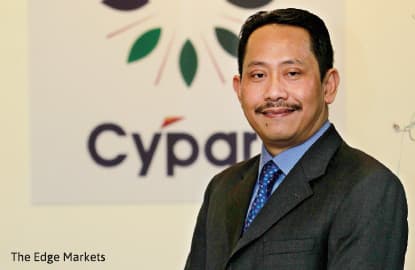
THE Malaysian investment community could perceive renewable energy as a passing fad, considering that it is unconventional and has yet to gain in popularity in the country. That said, Cypark Resources Bhd, which jumped on the solar energy bandwagon four years ago, may have proved that belief wrong.
The company’s net profit has ballooned, rising to RM50.68 million in its financial year ended Oct 31, 2016 (FY2016), from RM43.5 million in FY2015 and RM20.09 million in FY2011.
Encouraged by its sterling financial performance, Cypark is looking further afield. It is partnering a Singapore company and a world-renowned German technology firm to bid for a more than 40mwp (megawatt peak) solar project for buildings managed by the Singapore government.
“We have worked very hard to establish a qualified business entity through a joint venture (JV) and get us pre-qualified for a large government solar project in Singapore,” CEO Datuk Daud Ahmad tells The Edge. “We were recently informed that our two bids are among the shortlisted three.”
The result of the tender is expected to be announced next month. It is worth noting though that the project’s capacity is double Cypark’s current total installation, which is about 30mw; the tender is also for 20 years, which will generate substantial recurring income for the company. Thus, should it win the project, the group may see a significant earnings contribution from across the Causeway.
“Knowing how competitive and liberal the Singapore market is, this [being shortlisted] is something the team is very excited about. Hopefully, with a stroke of luck, we will win the tender. We also hope that it can provide us with a platform to penetrate the rest of the region,” Daud says.
Indeed, regional expansion is the second part (2017 to 2020) of the group’s strategic business transformation that was launched in 2013. The rationale behind the reorganisation was to overhaul Cypark’s portfolio from being primarily contract-based to one with recurring income and long-term concessions, and to switch its business activities from construction and landscaping to environmental engineering and renewable energy. In fact, the group’s new operations accounted for up to 85% of its revenue in FY2016.
“It has always been our long-term objective to export our expertise and services to the region. However, we decided that we should dedicate our limited resources to the local market and strengthen our competence first before moving overseas,” Daud explains.
In 2012, Cypark’s management indicated that the group wanted to be among the “first movers” in Myanmar. However, the plan did not materialise.
According to Daud, the group did not consider investing overseas until it set up the JV in Singapore last year. As for its Myanmar plan, he says the economic slowdown changed its direction. The group now sees Singapore as its first target because the city state’s energy market is transparent and, more importantly, it will have no problem with funding.
Daud does acknowledge that the Malaysian market will become more open and competitive in the next four years, especially with the Energy Commission set to award large-scale solar projects through competitive bidding.
In the meantime, the majority of Cypark’s income will still come from its local businesses. The group is expecting an organic growth of around 10% to 15% in revenue and profit in this financial year. “In FY2017, we expect our current business segments, especially solar, environmental engineering and solutions as well as construction to generate sustainable income,” says Daud.
In construction, the group’s PR1MA project is expected to contribute significantly to its revenue. Cypark also sees long-term revenue contribution of more than RM60 million from its green energy and operation and maintenance services. “We are also optimistic about the projects we have bid for, some of which are in the late stage of negotiations and which we will likely secure this year,” says Daud.
According to him, the group’s current bidding book, which includes the Singapore solar project, stands at more than RM2 billion. Most of the projects are local and their number is expected to increase as most of the tenders are done at the beginning of the year.
Last Tuesday, Cypark anounced that it had secured a RM15.19 million new landfill closure and restoration contract from the government. Due to the higher income generated by its landfill operation and its Ladang Tanah Merah project, the group’s net profit jumped 45% year on year to RM11.9 million in its fourth quarter ended Oct 31, 2016.
Based on the group’s completed plant, renewable energy, mainly solar, contributes about RM40 million a year to its revenue. Daud, who expects strong growth in this core area, is targeting renewable energy to contribute more than RM200 million a year by 2020, of which around RM70 million to RM80 million will come from the group’s Ladang Tanah Merah smart waste-to-energy project, which is expected to be commissioned by the end of the year.
Save by subscribing to us for your print and/or digital copy.
P/S: The Edge is also available on Apple's AppStore and Androids' Google Play.